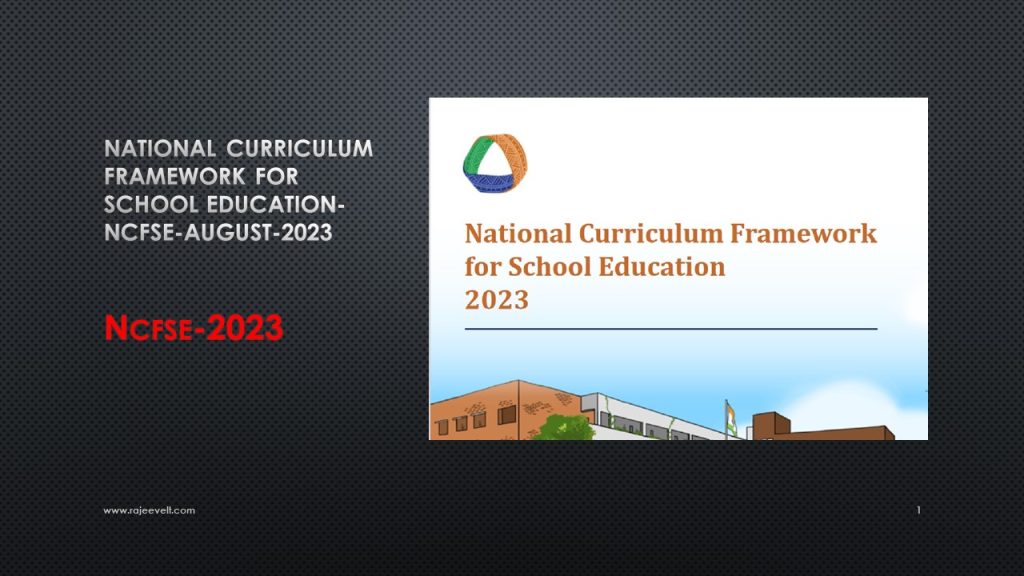
Aims and Vision of the National Curriculum Framework
The NEP 2020 called for the development of a new National Curriculum Framework (NCF) and new State Curriculum Frameworks (SCFs) as the bases for transforming school education in the country. This is in consonance with the empowerment of States in our federal structure, with education as a concurrent subject. This NCF would aim to help bring consonance and harmony across the curricula in the country.
In this spirit, it is of the utmost importance — for all our children of today and of tomorrow, and for the future of India — to develop an educationally robust and aspirational, yet practically implementable, NCF as well as SCFs, that will ensure that all students — no matter their circumstances of birth or background — have the best possible education, with complete support from the system.
At the level of the individual, the goal of the new curricula must be to foster a school education system that builds character and enables learners to be well-rounded, healthy, ethical, creative, rational, compassionate, and caring individuals, while also preparing them well for higher education as well as for gainful, fulfilling employment. It must aim not only for all students to learn, but more importantly to learn how to learn, so that they may become lifelong learners and also have the ability to constantly adapt to changing times. The new curricula must enable and inspire students to participate in and contribute to society — culturally, economically, and democratically.
At the level of society, the goal of the new curriculum must be to transform our society into one that is more just, equitable, humane, prosperous, sustainable, and rooted in Indian ethos and culture. It should enable India’s continued ascent and leadership on the global stage in terms of economic growth, social justice and equality, research and knowledge creation, scientific and technological advancement, environmental sustainability, and cultural preservation and vibrancy. The education system must ensure that the actual practice of the curricula, including content, pedagogy, environment, and culture in schools, clearly promote these individual and societal goals. (NCFSE-Page 15-16)
Summary of the Vision of the National Curriculum Framework for School Education-NCFSE-2023
The National Curriculum Framework (NCF) envisions the creation of a robust and achievable education framework aligned with the National Education Policy (NEP) 2020. This aims to empower states and promote educational harmony nationwide. The NCF and State Curriculum Frameworks (SCFs) aspire to provide a high-quality, inclusive education to all students, ensuring their holistic development and adaptability. The NCF 2023 aims to cultivate well-rounded, ethical, creative, and compassionate learners who can excel in higher education and careers. The emphasis is on nurturing
lifelong learning skills and adaptability to societal changes, fostering active participation and contribution to the cultural, economic, and democratic fabric of society.
The NCF 2023 seeks to transform society by promoting justice, equity, sustainability, and Indian cultural values. This vision aligns with India’s global leadership in diverse areas, from economic growth and scientific advancement to social justice and cultural preservation. The education system should visibly uphold these goals through its content, teaching methods, school environment, and cultural practices.
The NCF 2023 aims to create an education system that nurtures well-rounded individuals capable of lifelong learning and active societal engagement. This system contributes to India’s holistic growth, fostering equity, sustainability, and cultural vitality while maintaining global leadership.
Key Points of the Vision of the National Curriculum Framework for School Education-NCFSE-2023
- The NEP 2020 prompted the creation of a new National Curriculum Framework (NCF) and State Curriculum Frameworks (SCFs) to transform school education.
- This aligns with empowering states within the federal structure and recognizing education as a concurrent subject.
- The aim is to establish harmony and coherence across curricula in the country.
- The priority is to develop a robust and achievable NCF and SCFs that guarantee excellent education for all students, regardless of their background.
- The focus of the new curricula is to nurture well-rounded, ethical, creative, and compassionate individuals.
- It should prepare students effectively for higher education and meaningful employment while fostering lifelong learning and adaptability.
- The curricula should encourage active participation and contributions to society in cultural, economic, and democratic aspects.
- On a societal level, the goal is to transform society into a just, equitable, humane, prosperous, and sustainable one rooted in Indian ethos and culture.
- The curriculum should uphold India’s global leadership in economic growth, social justice, research, technology, environmental sustainability, and cultural preservation.
- The education system should ensure that curricular elements—content, pedagogy, environment, and culture in schools—strongly align with these individual and societal aspirations.

https://dsel.education.gov.in/sites/default/files/NCF2023.pdf
https://pib.gov.in/PressReleaseIframePage.aspx?PRID




[…] Curriculum Framework for School Education-NCFSE-AUGUST-2023 Summary of Aims and Vision of the National Curriculum Framework for School Education-NCFSE-2023 Five Key Points of National Curriculum Framework for School […]